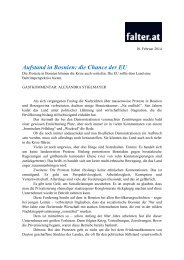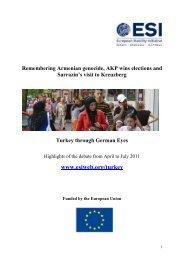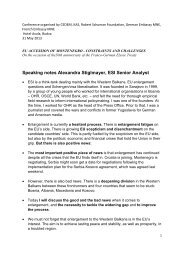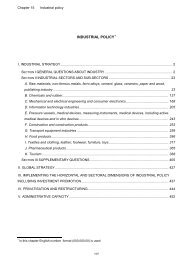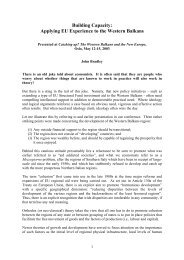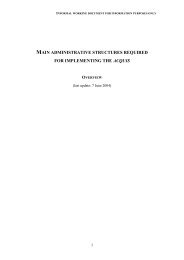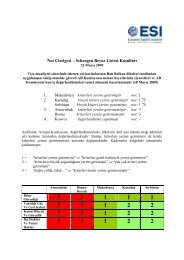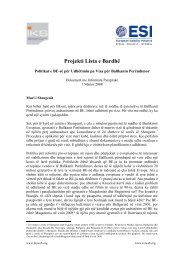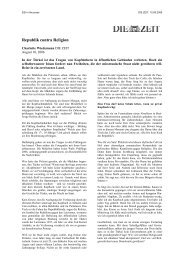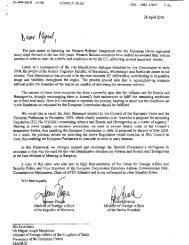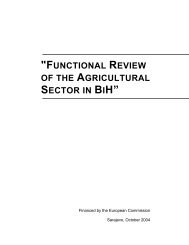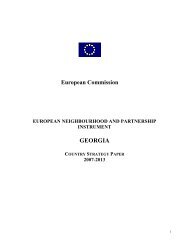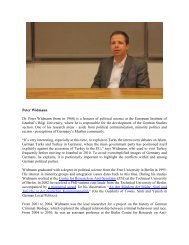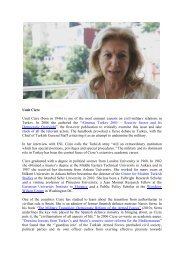Gender Assessment for USAID/Caucasus/Azerbaijan
Gender Assessment for USAID/Caucasus/Azerbaijan
Gender Assessment for USAID/Caucasus/Azerbaijan
You also want an ePaper? Increase the reach of your titles
YUMPU automatically turns print PDFs into web optimized ePapers that Google loves.
Throughout <strong>Azerbaijan</strong>, but especially in the regions, women face family restrictions to<br />
equal access to education, work and travel. The <strong>for</strong>mer system of control on school<br />
attendance has been removed, allowing greater freedom <strong>for</strong> educators to demand “gifts”<br />
from parents and <strong>for</strong> parents to keep children out of school (<strong>for</strong> financial or other<br />
reasons). Both women and men interviewed explained that families must protect a<br />
girl/woman’s reputation, and that, <strong>for</strong> example, the closure of regional higher education<br />
institutions has limited opportunities especially <strong>for</strong> young women because of the travel<br />
required. One Baku university graduate explained that her family would never permit her<br />
to study abroad because of what the neighbors might say. Outside of Baku, many men<br />
explained that they would not/do not permit their wives to take a job outside the home<br />
and several single women explained that they would have to stop working when they got<br />
married. The lack of women’s participation in public life at the local level was officially<br />
noted in SPPRED as women participated in the survey (in their homes) at a rate of 39%,<br />
but only 10% in the focus groups (held in public locations).<br />
In difficult financial times, young women are being disadvantaged not only because of<br />
educational preferences given to boys, but also because they can be pressured into early<br />
marriages. When the bride (or groom) is below the legal age, there is only a religious<br />
ceremony that is not recognized by law; the legal ceremony is conducted only after the<br />
couple is both of age. This practice is problematic <strong>for</strong> the girl because of health issues<br />
associated with early pregnancy, the loss of educational opportunities (ended with<br />
marriage), the lack of legal protections in case of marital problems, and the power<br />
imbalance of a young woman in the home of her new in-laws.<br />
The practice of cousin marriage is still widespread in <strong>Azerbaijan</strong>. The issue of bloodrelated<br />
marriages was even noted by President Aliyev in 1995. Anecdotally, several<br />
young working women credited their ability to reject family pressure <strong>for</strong> a cousin<br />
marriage to their living in cities and having good jobs. Reproductive health professionals<br />
expressed great concern about the health implications <strong>for</strong> children conceived in cousin<br />
marriages, and noted the high incidence of birth defects. New research and advocacy is<br />
being prepared by the NGO Symmetry to highlight the risks of cousin marriage – both<br />
the health of future children and the resulting vulnerability of the bride. As a rule, the<br />
family control is stronger in these marriages, the benefits accruing to the husband who<br />
can threaten total isolation to the bride should she try to challenge or leave a bad<br />
situation.<br />
Employment Discrimination and Sexual Harassment<br />
Despite a recent history of near-parity in education, women are more likely to be<br />
unemployed, are paid substantially less and discriminated against in the workplace.<br />
<strong>Azerbaijan</strong> labor law provides <strong>for</strong> non-discrimination in employment, including equal<br />
pay <strong>for</strong> men and women, protection <strong>for</strong> women from pregnancy discrimination, and<br />
positive discrimination from heavy and night work. Even in the female-dominated sectors<br />
of education and health/social, the ratio of women’s wages to men’s wages was just 72%<br />
DevTech Systems, Inc. 7 <strong>USAID</strong>/<strong>Caucasus</strong>/<strong>Azerbaijan</strong><br />
<strong>Gender</strong> <strong>Assessment</strong>



